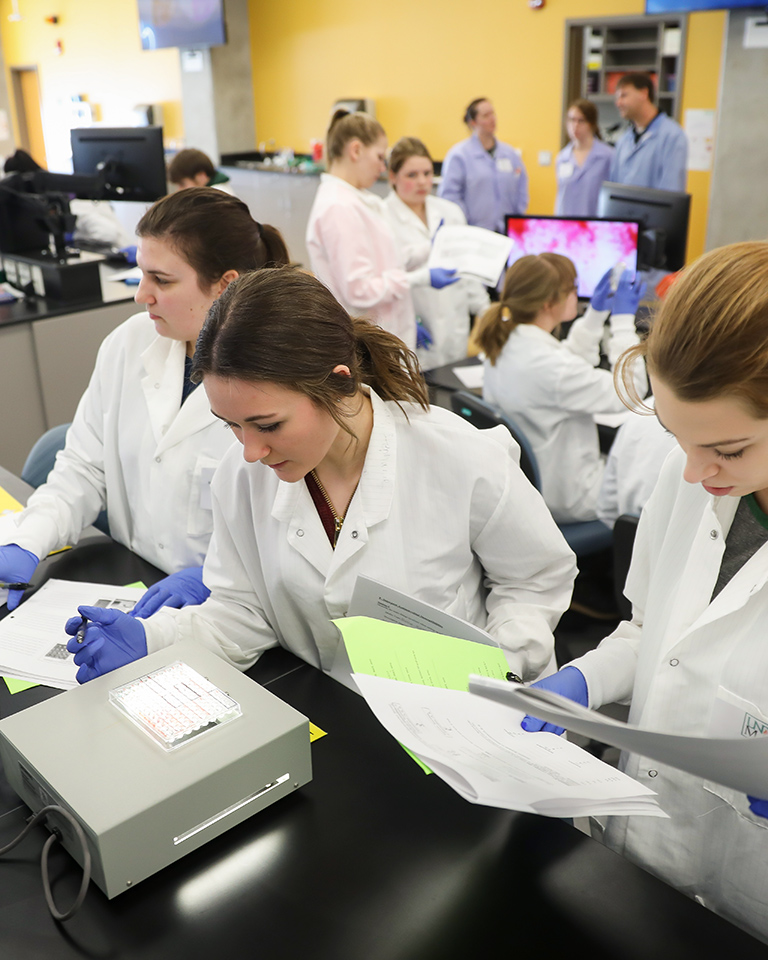
Online Master's in MLS Program
Are you a laboratorian that is ready for a new challenge?
Do you want to be a leader and advocate for the laboratory profession? Do you want to pursue an advanced degree but can't afford to re-locate and/or need to continue working throughout your studies? If so, the University of North Dakota (UND) Department of Medical Laboratory Science (MLS) might have the degree program for you.
MS in MLS Degree Program
The UND Department of MLS offers an online graduate program leading to the Master of Science (MS) degree in MLS. The MS in MLS degree program at UND is designed to accommodate students who are simultaneously working as laboratory professionals during their studies—all coursework is delivered online, there are no required on-campus visits. Course scheduling is flexible with few, if any, required meeting times throughout a semester.
The MS in MLS degree program focuses on developing and preparing future leaders, educators, managers, and scholars for the laboratory science profession.
- The curriculum ensures a generalist focus with core courses that emphasize content expertise in the major laboratory testing areas.
- Foundations courses aim to build skills in communication, leadership, professional advocacy, research, and problem solving.
- Elective courses allow students to customize their degree plans in specialized areas such as education and management.
- Culmination of the degree occurs with comprehensive exams and an Independent Study project that allow students to apply skills and knowledge gained throughout the program in a meaningful, individualized manner.
- Students typically take an average of 2.5-3 years to complete coursework.
Mission
The mission of the Department of Medical Laboratory Science (MLS) is to provide high-quality education that prepares students to positively impact healthcare through medical laboratory practice in the state and affiliated regions.
MS in MLS Program Mission
The mission of the Master of Science in Medical Laboratory Science program at the University of North Dakota is to generate and disseminate an advanced scholarly curriculum through distance courses to baccalaureate degree holding, certified medical laboratory science professionals through the state, nation, and world.
The curriculum is designed to prepare graduates for leadership roles in education, consulting, and healthcare administration.
Program Goals
The MS in MLS program sharpens students’ communication skills so they are able to professionally represent, and advocate for the laboratory. Specifically, students will be able to:
Goal 1 Objective
- Create and deliver clear, cohesive, and supported information that conveys a purposeful message
The MS in MLS program fosters development of skills for students to be professional leaders in the field of medical laboratory science. Specifically, students will be able to:
Goal 2 Objectives
- Identify approaches to effectively guide diverse, professional teams toward positive outcomes
- Apply problem solving strategies to address relevant and evolving issues
- Demonstrate skills and attributes characteristic of professional leadership
The MS in MLS program facilitates a deepened understanding of concepts within the field of medical laboratory science. Specifically, students will be able to:
Goal 3 Objective
- Integrate foundational, experiential, and emerging knowledge to explore and advance understanding of disciplinary concepts
The MS in MLS program prepares students to be advocates for the laboratory profession and their own professional growth. Specifically, students will be able to
Goal 4 Objectives
- Identify meaningful advocacy opportunities and impacts
- Formulate advocacy action plans
The MS in MLS program equips students with skills for scholarly research activities. Specifically, students will be able to:
Goal 5 Objectives
- Collect and critically analyze information to investigate relevant topics
- Synthesize and disseminate ethical, purposeful, and original scholarly products relevant to the field of laboratory science